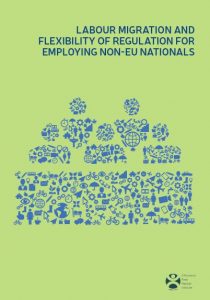 Migration issues create discussions not only in the areas of culture and nationality but in economics, politics and national security as well. Immigration from outside the EU is perceived as a problem by significant portions of voters in EU Member States (see infographics in Annex). On the one hand, it is often assumed that immigrants cause economic disturbances, on the other hand, they are seen as the driving force of the most dynamic sectors of the economy. Moreover, political opposition to immigration can arise even when the economic impact of immigration is overwhelmingly positive (Tabellini, 2018). Just like the migration inside the country, immigration from outside can lead to short-term economic disruptions even though it brings broad long-term benefits and allows many sectors to remain internationally competitive.
Migration issues create discussions not only in the areas of culture and nationality but in economics, politics and national security as well. Immigration from outside the EU is perceived as a problem by significant portions of voters in EU Member States (see infographics in Annex). On the one hand, it is often assumed that immigrants cause economic disturbances, on the other hand, they are seen as the driving force of the most dynamic sectors of the economy. Moreover, political opposition to immigration can arise even when the economic impact of immigration is overwhelmingly positive (Tabellini, 2018). Just like the migration inside the country, immigration from outside can lead to short-term economic disruptions even though it brings broad long-term benefits and allows many sectors to remain internationally competitive.
Some researchers argue that immigrants focus on economic sectors with jobs avoided by locals, low-skilled jobs and sectors experiencing seasonal labour shortages. However, other segments are strongly dependent on the labour supply of immigrants as well. Without migrant employees, such sectors would probably be forced to reduce the amount of labour used in their host country, e.g. automatize their production methods or move their activities overseas. Other fast growing sectors, e.g. IT, experience long-term shortages of labour that cannot be mitigated by the supply of qualified labour from domestic education systems (Münz et. al., 2006). This indicates that immigrants contribute to labour market efficiency and long-term economic growth (Somerwille and Sumption, 2009).
In recent years the number of foreigners who are coming to the EU as seasonal workers, posted workers, arriving as trainees or highly qualified workers, are seconded to work or transferred within the company, are working under a particular fast-track scheme (recruited in a facilitated manner), etc. is increasing. The free movement of workers is one of the fundamental freedoms of the EU. However, non-EU nationals may work in the EU only when they meet the eligibility requirements (e.g., annual entry quotas, labour market testing, labour market access for a particular employer or profession). Many of such requirements were transposed from a number of EU directives, but they have not yielded identical results in all EU Member States. Different migration policies have led to a wide variety of administrative procedures for hiring non-EU nationals. Nevertheless, non-EU nationals usually have to deal with extensive requirements and paperwork in order to meet EU labour regulations. This potentially contradicts the principle of flexibility in labour regulation, which should concentrate on few mandatory rules and establish common open-ended standards instead.
The Lithuanian Free Market Institute presents a report on the economic effects of migration and implications of employing non-EU nationals, providing a cross-country legislative and policy analysis on the flexibility of hiring of non-EU nationals in Lithuania, Estonia, Poland, Slovakia, Bulgaria and the Czech Republic as well as Denmark and Switzerland. For comparative purposes, only general requirements and procedures for hiring non-EU nationals are discussed and compared.
Download the full analysis Labour Migration and FLexibility of Regulation for Employing Non-EU Nationals
The analysis was prepared by the Lithuanian Free Market Institute in cooperation with the Institute of Market Economics (Bulgaria), the Center for Economic and Market Analyses (the Czech Republic), the Center for Free Economic Thought at the Estonian Business School (Estonia), the Civil Development Forum (Poland) and the Institute of Economic and Social Studies (Slovakia).
The publication was made possible through the support of a grant from the Rising Tide Foundation. The opinions expressed in the publication are those of the author(s) and do not necessarily reflect the views of the Rising Tide Foundation.